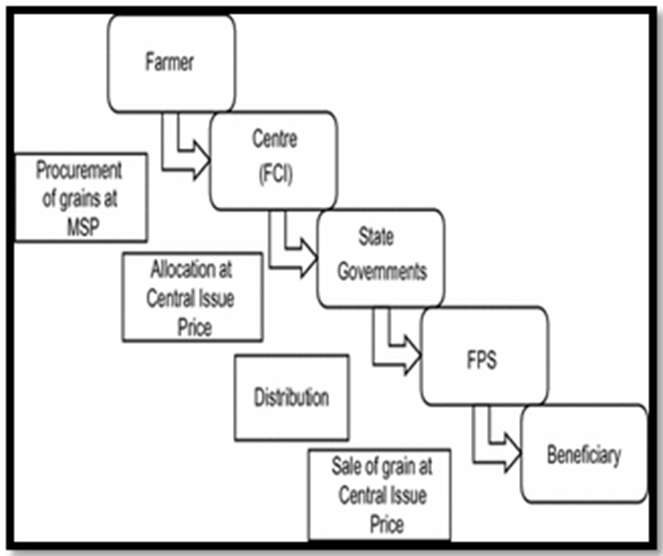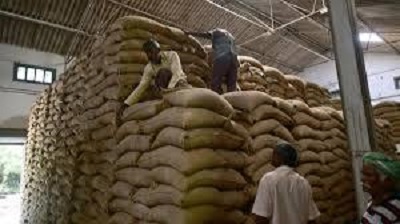Context-
Union Minister for Food and Consumer Affairs, Pralhad Joshi, announced on August 1, 2024, that states can directly purchase rice from the Food Corporation of India (FCI) under the Open Market Sale Scheme (Domestic) without participating in e-auctions. This move, effective from August 1, allows states to procure rice at ₹2,800 per quintal, a reduction from the previous rate of ₹2,900 per quintal. This new policy aims to provide more flexibility for states in managing their food distribution programs and addressing local demand dynamics.
The Procurement Paradigm
- Open Market Sale Scheme (Domestic) : The Open Market Sale Scheme (Domestic) or OMSS(D) allows the Ministry of Consumer Affairs, Food and Public Distribution to sell excess stocks of wheat and rice from the central pool at predetermined prices through e-auctions. The primary objective is to control market prices by providing food grains at reduced rates, thereby curbing inflation. In 2023, the FCI sold 3.04 lakh metric tonnes (LMT) of rice in the open market through e-auctions. The recent policy change enables states to bypass the e-auction process and procure directly from FCI.
- Role of the FCI : The FCI plays a critical role as the central government's primary instrument for procuring and distributing wheat, rice, and coarse grains. It is also responsible for maintaining buffer stocks to ensure food subsidy. The government's latest move aims to reduce the huge surplus stocks ahead of the upcoming Kharif season procurement.
- Current Stock Levels : The Ministry of Consumer Affairs had earlier communicated that the current paddy procurement increased the central pool rice stock to over 490 LMT, including 160 LMT of rice yet to be received after milling. The annual requirement for rice is around 400 LMT, and the buffer norms prescribed until July 1 require 135 LMT. With the current stock levels exceeding both the buffer stock norms and the annual requirement, the policy allows for more effective management of surplus stocks.
State-Level Implications
- Direct Procurement Benefits : The policy revision is particularly beneficial for states operating their own food distribution schemes and those that are not rice-abundant. For instance, in 2022-23, approximately 2.65 LMT of rice was sold under the OMSS, with Karnataka purchasing the highest share, followed by Tamil Nadu, Jharkhand, Jammu & Kashmir, and Assam. This direct procurement mechanism enables states to meet greater demand more efficiently.

- Reducing Central-State Tensions : The move also addresses potential conflicts between the centre and states over the distribution of essential food items. A notable example occurred last year when the central government, in a notification dated June 13, halted the sale of rice and wheat from the central pool under OMSS to states. This decision led to a political tussle with the newly elected Congress government in Karnataka, which accused the center of undermining their 'Anna Bhagya' scheme. The scheme promised 10 kg of food grains/rice to every member of below poverty level (BPL) households and Antyodaya card holders every month. The suspension of rice sales left the scheme in jeopardy.
Future Prospects and Challenges
- Ensuring Adequate Supply : With the new policy, states now have a streamlined process to procure rice directly from FCI, which can help them manage their food distribution programs more effectively. However, ensuring that there is adequate supply to meet the increased demand from states remains a challenge. The FCI's current storage capacity and procurement mechanisms will need to be robust to handle this direct purchase model.
- Impact on Market Prices : While the OMSS(D) aims to control market prices and curb inflation, the direct purchase policy's long-term impact on market prices needs careful monitoring. By allowing states to procure large quantities directly, there could be fluctuations in market supply and demand dynamics, potentially affecting prices.
- Buffer Stock Management : The FCI's ability to maintain adequate buffer stocks while meeting the states' procurement demands is crucial. The policy must ensure that surplus stocks are reduced without compromising the buffer norms essential for food security. Effective management of procurement, storage, and distribution processes will be vital to achieving this balance.
- Policy Implementation and Monitoring : The successful implementation of this policy requires continuous monitoring and evaluation. States will need to provide regular feedback on procurement processes and any challenges faced. The central government must be responsive to these inputs and make necessary adjustments to the policy framework to ensure its effectiveness.
- Addressing Political Dynamics : The direct purchase policy also has political implications, as seen in the Karnataka case. Ensuring that the policy is implemented transparently and equitably across states can help mitigate potential political conflicts. Clear communication and collaboration between the central and state governments are essential to address any issues that arise.
Conclusion
The direct purchase of rice from FCI by states represents a significant shift in India's food distribution policy. By enabling states to procure rice without participating in e-auctions, the policy aims to provide more flexibility and efficiency in managing food distribution programs. While the move has potential benefits, including reducing surplus stocks and mitigating central-state conflicts, its success will depend on effective implementation, continuous monitoring, and addressing the challenges of supply, market prices, and buffer stock management. As states begin to navigate this new procurement paradigm, the central government's support and responsiveness will be key to ensuring that the policy achieves its intended goals and benefits the targeted populations.
|
Probable questions for UPSC Mains Exam-
|
Source- The Hindu







